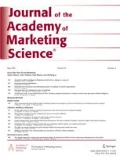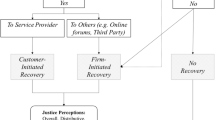Abstract
This article reports the development of a theoretical model of consumer complaint behavior by using cognitive appraisal theory as its foundation. Because of its importance to management and lack of attention in the marketing literature, specific emphasis is placed on the phenomenon of noncomplaining and the role of consumer emotion in dissatisfying marketplace experiences. The model presents cognitive appraisal as the key element in the evaluation of consumer threat and harm, which subsequently may result in psychological stress. Stressful appraisal outcomes are suggested to elicit emotive reactions that, in conjunction with cognitive appraisal, influence the type of coping strategy used by the consumer. Three coping strategies (problem focused, emotion focused, and avoidance) are identified and discussed. Key propositions are illustrated by using in-depth interview data from a sample of older female consumers.
Similar content being viewed by others
References
Andreason, Alan R. 1984. “Consumer Satisfaction in Loose Monopolies: The Case of Medical Care.”Journal of Public Policy and Marketing 2: 122–135.
— 1985. “Consumer Responses to Dissatisfaction in Loose Monopolies.”Journal of Consumer Research 12 (September): 135–141.
— and Jean Manning. 1990. “The Dissatisfaction and Complaining Behavior of Vulnerable Consumers.”Journal of Consumer Satisfaction, Dissatisfaction and Complaining Behavior 3: 12–20.
Baum, A., A. R. Fleming, and J. E. Singer 1983. “Coping With Victimization by Technological Disaster.”Journal of Social Issues 39: 117–138.
Bearden, William, and Richard L. Oliver. 1985. “The Role of Public and Private Complaining in Satisfaction With Problem Resolution.”Journal of Consumer Affairs 19 (2): 222–240.
Blodgett, Jeffrey G., and Donald H. Granbois. 1992. “Toward an Integrated Conceptual Model of Consumer Complaining Behavior.”Journal of Consumer Satisfaction, Dissatisfaction and Complaining Behavior 5: 93–103.
Bolfing, Claire P. 1989. “How Do Consumers Express Dissatisfaction and What Can Service Marketers Do About It?”Journal of Services Marketing 3 (Spring): 5–23.
Brown, Steven P., and Richard F. Beltramini. 1989. “Consumer Complaining and World of Mouth Activities: Field Evidence.” InAdvances in Consumer Research. Vol. 16. Ed. Thomas K. Srull. Ann Arbor, MI: Association for Consumer Research, 9–16.
Cadotte, Ernest R., Robert B. Woodruff, and Roger L. Jenkins. 1987. “Expectations and Norms in Models of Consumer Satisfaction.”Journal of Marketing Research 24 (August): 305–314.
Campbell, Anne. 1993.Men, Women and Aggression. New York: Basic Books.
Day, Ralph L. 1984. “Modeling Choices Among Alternative Responses to Dissatisfaction.” InAdvances in Consumer Research. Vol. 11. Ed. Thomas C. Kinnear. Provo, UT: Association for Consumer Research, 496–499.
— and Stephen B. Ash. 1979. “Consumer Response to Dissatisfaction With Durable Products.” InAdvances in Consumer Research. Vol. 6. Ed. William Wilkie. Ann Arbor, MI: Association for Consumer Research, 438–444.
— and Muzaffer Bodur. 1978. “Consumer Response to Dissatisfaction With Services and Intangibles.” InAdvances in Consumer Research. Vol. 5. Ed. H. Keith Hunt. Ann Arbor, MI: Association for Consumer Research, 263–272.
— and E. Laird Landon, Jr. 1976. “Collecting Comprehensive Consumer Complaint Data by Survey Research.” InAdvances in Consumer Research. Vol. 3. Ed. Beverlee B. Anderson. Ann Arbor, MI: Association for Consumer Research, 263–268.
— and — 1977. “Toward, a Theory of Consumer Complaining Behavior.” InConsumer and Industrial Buying Behavior. Eds. Arch G. Woodside, Jagdish N. Sheth, and Peter D. Bennett. New York: North Holland, 425–437.
Dellande, Stephanie. 1995. “Consumer Response to Dissatisfaction: An Overview” Graduate School of Management Working Paper No. MK95012, University of California, Irvine.
DeLongis, Anita, James C. Coyne, Gayle Dakof, Susan Folkman, and Richard S. Lazarus. 1982. “Relationship of Daily Hassles, Uplifts, and Major Life Events and Health Status.”Health Psychology 1 (2): 119–136.
Dohrenwend, Barbara Snell, Larry Krasnoff, Alexander R. Askenasy, and Bruce P. Dohrenwend. 1978. “Exemplification of a Method for Scaling Life Events: The PERI Life Events Scale.”Journal of Health and Social Behavior 19 (June): 205–229.
Eisenberg, Nancy, Richard A. Fabes, Mark Schaller, and Paul A. Miller. 1989. “Sympathy and Personal Distress: Development, Gender Differences, and Interrelations of Indexes.” InEmpathy and Related Emotional Processes. Ed. Nancy Eisenberg. San Francisco: Jossey-Bass, 107–126.
Endler, Norman S. and James D. A. Parker. 1990. “Multidimensional Assessment of Coping: A Critical Evaluation.”Journal of Personality and Social Psychology 58 (May): 844–854.
— and —. 1993. “If It Changes, It Might, Be Unstable: Examining the Factor Structure of the Ways of Coping Questionnaire.”Psychological Assessment 5 (September): 361–368.
Folkes, Valerie S. 1984. “Consumer Reaction to Product Failure: An Attributional Approach.”Journal of Consumer Research 10 (March): 398–409.
—, Susan Koletsky, and John L. Graham. 1987. “A Field Study of Causal Inferences and Consumer Reaction: The View from the Airport.”Journal of Consumer Research 13 (March): 534–539.
Folkman, Susan, and Richard S. Lazarus. 1980. “An Analysis of Coping in a Middle-Aged Community Sample.”Journal of Health and Social Behavior 21 (September): 219–239.
— and —. 1985. “If It Changes, It Must Be a Process: Study of Emotion and Coping During Three Stages of a College Examination.”Journal of Personality and Social Psychology 48, (January): 150–170.
— and —. 1991., “Coping and Emotion.” InStress and Coping: An Anthology. Eds. Alan Monat and Richard S. Lazarus. New York: Columbia University Press, 207–227.
——, Christine Dunkel-Schetter, Anita DeLongis, and Rand J. Gruen. 1986. “Dynamics of a Stressful Encounter: Cognitive Appraisal, Coping, and Encounter Outcomes.”Journal of Personality and Social Psychology 50 (May): 992–1003.
Fornell, Claes and Birgir Wernerfelt. 1987. “Defensive Marketing Strategy by Customer Complaint Management: A Theoretical Analysis.”Journal of Marketing Research XXIV (November): 337–346.
— and Robert Westbrook. 1979. “An Exploratory Study of Assertiveness, Aggresiveness, and Consumer Complaining Behavior.” InAdvances in Consumer Research. Vol. 6. Ed. William Wilkie. Ann Arbor, MI: Association for Consumer Research, 105–110.
Geen, Russell G. 1990.Human Aggression. Philadelphia: Open University Press.
Gilly, Mary C., and Betsy D. Gelb. 1982. “Post-Purchase Consumer Processes and the Complaining Consumer.”Journal of Consumer Research 9 (December): 323–328.
Godwin, Beth, Paul G. Patterson, and Lester W. Johnson. 1995. “Emotion, Coping and Complaining Propensity Following a Dissatisfactory Service Encounter.”Journal of Satisfaction, Dissatisfaction and Complaining Behavior 8: 155–163.
Hart, Christopher W. L. 1988. “The Power of Unconditional Service Guarantees.”Harvard Business Review 66 (July–August): 54–62.
Hirschman, Albert O. 1970.Exit, Voice and Loyalty. Cambridge, MA: Harvard University Press.
Izard, Carroll E. 1977.Human Emotion. New York: Plenum.
— 1991.The Psychology of Emotions. New York: Plenum.
Jacoby, Jacob, and James J. Jaccard. 1981. “The Sources, Meaning, and Validity of Consumer Complaint Behavior: A Psychological Analysis.”Journal of Retailing 57 (Fall): 4–24.
Jordan, Judith V. 1991. “Empathy and Self-Boundaries.” InWomen’s Growth in Connection. Eds. Judith V. Jordan, Alexandra G. Kaplan, Jean Baker Miller, Irene P. Stiver, and Janet L. Surrey. New York: Guilford, 67–80.
—, Janet L. Surrey, and Alexandra G. Kaplan. 1991. “Women and Empathy: Implications for Psychological Development and Psychotherapy.” InWomen’s Growth in Connection. Eds. Judith V. Jordan, Alexandra G. Kaplan, Jean Baker Miller, Irene P. Stiver, and Janet L. Surrey. New York: Guilford, 27–50.
Kassarjian, Harold H. 1977. “Content Analysis in Consumer Research.”Journal of Consumer Research 4 (June): 8–18.
Krishnan, S. and Valerie A. Valle. 1979. “Dissatisfaction Attributions and Consumer Complaint Behavior.” InAdvances in Consumer Research. Vol. 6. Ed. William Wilkie. Ann Arbor, MI: Association for Consumer Research, 445–449.
Lazarus, Richard S. 1966.Psychological Stress and the Coping Process. New York: McGraw-Hill.
— 1991a. “Cognition and Motivation in Emotion.”American Psychologist 46 (April): 352–367.
— 1991b.Emotion and Adaptation. New York: Oxford University Press.
— 1993. “From Psychological Stress to the Emotions: A History of Changing Outlooks.”Annual Review of Psychology 44: 1–21.
— and Anita DeLongis. 1983. “Psychological Stress and Coping in Aging.”American Psychologist 38 (March): 245–254.
— and Susan Folkman. 1984.Stress, Appraisal, and Coping. New York: Springer.
—, Allen D. Kanner, and Susan Folkman. 1980. “Emotions: A Cognitive-Phenomenological Analysis.” InEmotion: Theory, Research and Experience. Vol. 1. Eds. Robert Plutchick and Henry Kellerman. New York: Academic Press, 189–217.
— and Raymond Launier. 1978. “Stress-Related Transactions Between Person and Environment.” InPerspectives in Interactional Psychology. Eds. L. A. Pervin and M. Lewis. New York: Plenum, 287–327.
Lott, Bernice and Diane Maluso. 1993. “The Social Learning of Gender.” InThe Psychology of Gender. Eds. Anne E. Beall and Robert J. Sternberg. New York: Guilford, 99–126.
McCrae, Robert R. 1982. “Age Differences in the Use of Coping Mechanisms.”Journal of Gerontology 37:454–460.
Moyer, Mel S. 1984. “Characteristics of Consumer Complainants: Implications for Marketing and Public Policy.”Journal of Public Policy and Marketing 3:67–84.
Nyer, Prashanth U. 1997. “A Study of the Relationships Between Cognitive Appraisals and Consumption Emotions.”Journal of the Academy of Marketing Science 25 (Fall): 296–304.
Oliver, Richard. 1980. “A Cognitive Model of the Antecedents and Consequences of Satisfaction Decisions.”Journal of Marketing Research XVII (November): 460–469.
—. 1993. “Cognitive, Affective, and Attribute Bases of the Satisfaction Response.”Journal of Consumer Research 20 (December): 418–430.
Omdahl, Becky Lynn. 1995.Cognitive Appraisal, Emotion and Empathy. Mahwah, NJ: Lawrence Erlbaum.
Plutchik, Robert. 1980.Emotion, a Psychoevolutionary Synthesis. New York: Harper & Row.
Reichheld, Frederick F. and W. Earl Sasser, Jr. 1990. “Zero Defections: Quality Comes to Services.”Harvard Business Review 68 (September–October): 105–111.
Richins, Marsha L. 1983. “Negative Word-of-Mouth by Dissatisfied Consumers: A Pilot Study.”Journal of Marketing 47 (Winter): 68–78.
— 1987. “A Multivariate Analysis of Responses to Dissatisfaction.”Journal of the Academy of Marketing Science 15 (Fall): 24–31.
Rogers, John C. and Terrell G. Williams. 1990. “Consumer Personal Values as Antecedents to Dyadic and Third Party Public Consumer Complaining Behavior: An Exploratory Study.”Journal of Satisfaction, Dissatisfaction, and Complaining Behavior 3:71–81.
Singh, Jagdip. 1988. “Consumer Complaint Intentions and Behavior: Definitional and Taxonomical Issues.”Journal of Marketing 52 (January): 93–107.
—. 1990. “A Typology of Consumer Dissatisfaction Response Styles.”Journal of Retailing 66 (Spring): 57–99.
Smith, Craig A. and Phoebe C. Ellsworth. 1985. “Patterns of Cognitive Appraisal in Emotion.”Journal of Personality and Social Psychology 48 (4): 813–818.
Sorensen, Robert C. and William M. Strahle. 1990. “An Analysis of the Social Aspects of Complaint Reporting: A Survey of VCR Owners.”Journal of Satisfaction, Dissatisfaction, and Complaining Behavior 3:82–91.
Spreng, Richard A., Scott B. MacKenzie, and Richard W. Olshavsky. 1996. “A Reexamination of the Determinants of Consumer Satisfaction.”Journal of Marketing 60 (July): 15–32.
Strutton, David and James R. Lumpkin. 1994. “Problem- and Emotion-Focused Coping Dimensions and Sales Presentation Effectiveness.”Journal of the Academy of Marketing Science 22 (Winter): 28–37.
Tavris, Carol. 1982.Anger: The Misunderstood Emotion. New York: Simon & Schuster.
Technical Assistance Research Program (TARP). 1979.Consumer Complaint Handling in America: A Final Report. Washington, DC: White House Office of Consumer Affairs.
Thomas, Sandra P. 1993. “Anger and Its Manifestations.” InWomen and Anger. Ed. Sandra P. Thomas. New York: Springer, 40–67.
Thompson, Craig J., William B. Locander, and Howard R. Pollio. 1989. “Putting Consumer Experience Back Into Consumer Research: The Philosophy and Method of Existential-Phenomenology.”Journal of Consumer Research 16 (September): 133–146.
Warland, Rex H., Robert O. Herrmann, and Jane Willits. 1975. “Dissatisfied Consumers: Who Gets Upset and Who Takes Action.”Journal of Consumer Affairs 9 (Winter): 148–163.
Weber, Robert Philip. 1985.Basic Content Analysis. Beverly Hills, CA: Sage.
Weiner, Bernard. 1986.An Attributional Theory of Motivation and Emotion. New York: Springer Verlag.
Westbrook, Robert A. 1987. “Product/Consumption-Based Affective Responses and Postpurchase Behavior.”Journal of Marketing Research XXIV (August): 258–270.
Zaltman, Gerald, Rajendra K. Srivastava, and Rohit Deshphande. 1978. “Perceptions of Unfair Marketing Practices.” InAdvances in Consumer Research. Vol. 5. Ed. H. Keith Hunt. Ann Arbor, MI: Association for Consumer Research, 263–268.
Author information
Authors and Affiliations
Additional information
Nancy Stephens is an associate professor of marketing at Arizona State University. She has published a variety of studies on consumer behavior, services marketing, and marketing communications issues in such publications as theJournal of Marketing Research, theJournal of Advertising Research, theJournal of Advertising, and theJournal of Services Marketing, as well as many conference proceedings.
Kevin P. Gwinner is an assistant professor of marketing in the School of Business at East Carolina University, North Carolina. His research interests include performance issues of customer-contact service employees, consumer complaint behaviors, and corporate sponsorship issues. His research has been published in theJournal of the Academy of Marketing Science, theInternational Journal of Service Industry Management, International Marketing Review, and theJournal of Marketing Education.
Rights and permissions
About this article
Cite this article
Stephens, N., Gwinner, K.P. Why don’t some people complain? A cognitive-emotive process model of consumer complaint behavior. J. of the Acad. Mark. Sci. 26, 172–189 (1998). https://doi.org/10.1177/0092070398263001
Issue Date:
DOI: https://doi.org/10.1177/0092070398263001




